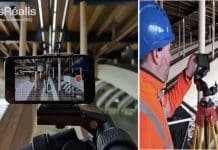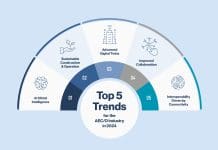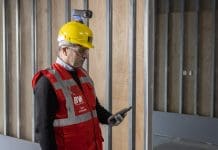A new Data Exploration Licence has been launched by the UK’s Geospatial Commission to simplify access to and use of geospatial data
April saw the launch of a new Data Exploration Licence that, for the first time, makes geospatial data from key agencies accessible in one place.
The Data Exploration Licence was developed by the Geospatial Commission, an independent committee that sits at the heart of government as part of the Cabinet Office, as part of a £5m investment to unlock the value of location-based data held by its partner bodies – the British Geological Survey, HM Land Registry, Ordnance Survey, the Coal Authority and the UK Hydrographic Office.
Using the licence, anyone can now freely access data held by these bodies for research, development and innovation purposes, whereas previously they would have needed separate licences.
They can also be confident that they are using data on consistent, harmonised terms and that various datasets can be used, combined and delivered in the same way, subject to the same conditions.
There is no cost to access data and users will be permitted to share some of their results with others.
Professor John Ludden, chief executive of the British Geological Survey, leaders of the licensing project, said: “BGS are always looking for ways to get its data used in new and novel ways. This new licence gives innovators a safe space to see what’s possible with data without having to worry about financial commitments or complicated restrictions on how the data should be used.”
Overall, it is estimated that using location-linked data more productively could unlock up to £11bn of extra value for the UK economy every year.
The commission is now working on a national geospatial strategy, which it will publish at the end of the year.
It is currently running a number of projects to inform this work and to improve the UK’s geospatial data infrastructure by developing consistent data standards, while improving the accessibility, interoperability and quality of those datasets.
The Data Exploration Licence is one of four initiatives run by the joint programme between the partner bodies.
The others cover:
- Data discoverability: Through this project, the partner bodies have published catalogues outlining all of the datasets they hold and have made this available on data.gov.uk.
- Linked identifiers: This ongoing work is looking at how to increase the integration potential of different datasets across partner bodies and beyond, in order to drive both operational efficiency and innovation.
- Enhancing of the Core Data Asset: This work led to the partner bodies sharing information and approaches on using third-party data to enhance the quality of publicly held geospatial datasets, specifically their own data.
Crowdsourcing data to improve services
The commission has also partnered with Innovate UK to launch a competition exploring the benefits and challenges of crowdsourcing data.
Organisations were invited to apply for a share of a £1.5m pot of government funding for projects that use data linked to a location to improve public services. Grants of between £50,000 and £750,000 were available.
Ten winning projects were announced in April. They include a collaborative project to develop a database of the UK’s urban trees for use by businesses, government and researchers; a scheme to allow communities to automatically identify areas that need improvements to street infrastructure; and Your.Vu.City, which will engage the public with the planning process to improve understanding of the built environment.
Digital mapping to save lives
Elsewhere, April saw the commission announce plans to create a new digital map known as the Underground Asset Register.
It is estimated that accidental strikes on gas, electricity and water pipes and cables cost the UK economy £1.2bn a year, causing havoc for residents and road users, while putting workers at risk of serious injury or even death.
The Underground Asset Register aims to prevent disruption and potentially lethal accidents by bringing together existing data on underground pipes and cables to create the first comprehensive map. Two pilot projects backed by £3.9m have been launched in Sunderland and London to test prototypes.
In the North East, Ordnance Survey is working with Northumbrian Water, Northern Gas Networks, Northern Powergrid and Openreach to develop a system that allows workers to see underground pipes and cables on mobile phones or laptops before they start digging.
In the capital, work will be led by the Greater London Authority in collaboration with infrastructure providers and local authorities.
David Henderson, managing director of Ordnance Survey Great Britain, said: “The creation of an underground map of utility assets has long been an ambition of Ordnance Survey and over the last year, we have been working closely with Northumbrian Water and a consortia of utility companies and local authorities in the North East of England to explore how accurate geospatial data can improve underground infrastructure maintenance and inform new build development projects.
“The investment being made by the Geospatial Commission will ultimately enable the utility industry to more efficiently access, use and share data describing otherwise hidden infrastructure, thereby reducing operational costs, minimising disruption and accelerating completion of site works.”
10 projects to win funding in the crowdsourcing data competition are:
Communitree
Project partners: Forest Research, Open University and Treework Services.
This project will develop the largest and highest quality urban tree map in the world for use by business, government and other research needs.
Your.Vu.City
Project partners: Vu.City, Pipers Projects and University College London.
Vu.City will engage the public with the planning process to improve the understanding of the built environment.
Crowd Blackspot Intelligence for 5G Rollout
Project partners: Ranplan Wireless Network Design and University of Warwick.
This project will look at crowdsourcing service complaints to help guide 5G rollout for rural and urban areas.
Crowdsourcing for a Digital Geospatial Joint Strategic Needs Assessment
Project partners: City Science Corporation and University of Exeter.
Relevant databases will be brought together to enable members of the public to take an active role in health outcomes, by crowdsourcing data such as air quality, to enable practitioners to improve targeting of resources and the health of the nation.
Precision Indoor Positioning Information System (PINPOINT)
Project partner: Cartographix.
This project will use existing WiFi networks and smartphone sensors to help better indoor navigation of public buildings.
StreetFocus
Project partners: Cyclestreets and Planit.
Communities will be able to automatically identify areas that need improvements to street infrastructure.
Coreo
Project partner: Natural Apptitude.
This platform will enable anyone to build and run geospatial citizen science projects to improve collection, management and maintenance of geospatial data.
Routing Innovation through Data Engineering (RIDE)
Project partner: Beeline.
RIDE will develop route optimisation to increase cyclist safety and uptake.
Generating crowdsourcing geospatial data
Project partner: Transreport.
This project will undertake research to understand the accessibility issues for transportation and the user experience for a wide range of disabilities, and how the data collected can be used to improve the service.
The Neighbourhood Safety Index
Project partner: Synced.
This will produce the first integrated live score of how safe a neighbourhood is.
PBC Today
Tel: 0843 504 4560

















